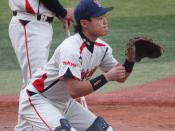Former Atlanta Braves slugger and the first American all-star to play in Japan during the prime of his career was Bob Horner. His brief career was with the Yakult Swallows. This was the inspiration for the first chapter of Robert Whiting's celebrated book You Gotta Have Wa.
He was just 29 years old when he joined the Swallows, Horner's admission into Japan caused somewhat of a media stir. Since he was given the jersey number 55 the Swallows owner hoped that he would hit that many home runs that season, big things were anticipated of him. Though Honah-san, as referred to by the Japanese got off to a good start, He was struck with a mid-season injury and missed several games. This provoked the Japanese sports tabloids to react resentfully. "Horner was lazy", "Horner was faking it", and "Horner was milking an injury". These were just some of the views.
In fact he was recovering as he saw fit. However it may not have got him on the good side of the press, but soon after his return he began to belt home run after home run. Again he was the hero, he was offered a contract extension at the end of his first season, but decided to decline it. The intense criticism from the media and the lack of privacy on and off the field were the major factors in his decision. In his one season, Horner led the team with 31 home runs and knocking in 73 RBIs and generating a .327 batting average.
There has been limited success for American players and managers in Japanese
baseball for many reasons. The reasons why they don't routinely succeed at "their" sport in another country may be because of culture shock or over assurance, but it mainly revolves around the fact that their method of baseball won't make it in Japan. Many American professional ball players have made the journey to Japan to play ball and hope for a new start. In fact the players that go to Japan from America are in a position that demands a change. These players usually don't make massive impacts on the field, many struggle and most turn out to be better players as a result. Players that transfer view the lengthy practices as "excessive" and the pre-game drills are sought at as "crazy". Most American players just don't have the same work ethic that the Japanese players have and it shows on and off the field. Many American ball players cannot fully grasp the concept of team unity or as referred to by Whiting as "wa". The Japanese meaning of "wa" is "team spirit and unity." With this explanation, the reader can come to a perception of the spirit of "wa" and how significant baseball is to the Japanese people.
American ball players in Japan were viewed as outsiders. The Japanese have a word that was used towards them "gaijiin" which means foreigner. This term was thought to be offensive considering the importance on "wa". An outsider usually has no place or meaning in Japanese society. American players are known for their individualism on the field. This is an immediate insult towards their team and an interruption of the teams "wa", and this sort of behavior was not tolerated.





